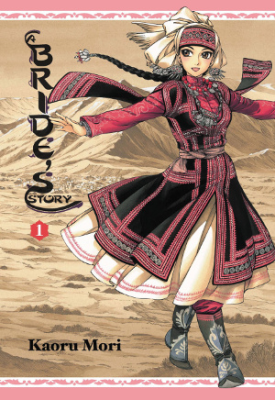(Against the avalanche of positive reviews, I strongly urge you to read this one before picking up this series. Because I regret ever picking it up, and urge anyone in search of anything this manga purports to provide to look elsewhere.)
Otoyomegatari is a manga about life on the Mongolian steppes. As you may have gathered from the tags, or the description, it attempts to be a "cute" upbeat story. There is nothing wrong with that. There is nothing wrong with the premise (well, maybe a little bit -- we'll get to that.) The way the manga is executed however, which may seem innocuous at first, becomes extremely disturbing in later volumes. To explain how and why, we'll need a little more context.
Otoyomegetari has a shifting point of view. It does not just cover one couple, either, or one family, or even one village, but attempts to be a sweeping portrait of different lifestyles across Asia and eastern Europe during this period. The first couple it portrays is a newly arranged marriage in a small village on the Mongolian steppes (arranged marriage may not be a particularly cheerful subject, but they like each other well enough and the respective families that negotiated the marriage are both more or less good people in their own ways, so all in all a pretty cheerful set up.)
(Stick with me, I swear this is going somewhere.)
As was mentioned, you might imagine this is not a particularly gritty portrayal of what small time village life on the Mongolian steppes actually looked like -- and you would be mostly right. Disease is virtually not existent, the deaths can be counted on one hand (and only happen to villains anyways.) Everyone is sparkly clean, daily village work is portrayed as a fun collective task.
The problem is that this manga does not contain itself to being a happy go lucky story set in some parallel universe sixteenth century Mongolia where everyone is civilized and there are no problems. Very real problems are introduced, such as war, poverty, slavery, the lack of rights for women (in some chapters they're bought and sold like cattle), polygamy, and other issues.
The problem is there is no tonal shift whatsoever. I mean that in the worst possible way you can imagine. All these serious issues show up at various points, but never is there the slightest hint that maybe any of these horrible, horrible events could possibly be wrong. The series, impossibly, keeps its upbeat attitude, and ends up portraying all of these ugly aspects of the medieval world as "fun" and "quirky" aspects of its happy-go-lucky self.
I can not stress enough how disturbing I found this in later volumes. Slavery? Oh so fun. Don't you know all slaves just wanted to help and serve their masters, just like all those adorkable manga maids? War? Haha those silly Russians never learn. Famine and disease? Dohoho, look at how cute these people terrified from dying of incurable diseases are. Polygamy and literal harems? Obviously a consensual joy for all involved.
This is like the evil alternate universe version of Leave It To Beaver. I'm half expecting a chapter about how much of a silly fun fun fest the bubonic plague was.
The mangaka's completely uncritical, un-ironic, and upbeat portrayal of the ugliest aspects of medieval civilization (or lack thereof) is extremely disturbing. Some of the things that happen in this manga are horrifying, and should make you step back and gasp but instead are portrayed happily as part of the most f***ed up sitcom on earth. I wish I could go apologize to all the people who lived through these horrors, 'cause this is just complete disrespect.
If you want a happy, upbeat romance let me give you a few suggestions off the top of my head; Akagami no Shirayukihime (look, its even another medieval-style fantasy), Boku wa Hajikko ga Suki, Shiawase Kissa 3-choume. There's tons more out there. Just do yourself a favor and turn around and go read something else. Anything else. 'Cause this is crap.
(P.S. The fact that anyone called this manga "educational" is a huge joke.)





